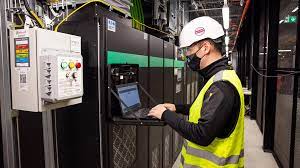Battery Energy Storage Systems (BESS)
Battery Energy Storage Systems (BESS) are systems that store electrical energy in batteries for later use. BESS are used for a variety of applications, including Peak Shaving, Grid Support, Renewable Energy Integration (Solar, Wind Power, etc.), and Backup Power for critical loads,.

The following are factors to consider when specifying a BESS:
- Capacity: The capacity (power rating needed) of the BESS should be chosen based on the energy requirements of the system and the length of time that backup power is needed. For example; typical small energy storage systems may range from 50 – 300 kilowatts (kW). Mid-range systems may range from 500kW to 2000kW (2 MW), and so on. Typical battery run times are 2 – 4 hours, however longer battery backup time, e.g. 5 hours, may be desirable for peak shaving during periods of high energy demand and associated elevated electric utility rates.
- Efficiency: The operating efficiency of the BESS should be considered to minimize energy losses and maximize the system’s performance.
- Battery type: Different battery types have different performance characteristics, including energy density, cycle life, and safety. The battery type should be chosen based on the specific requirements of the system. Presently Lithium or Valve Regulated Lead Acid (VRLA) are the most widely used dependent on cost, technical and environmental requirements, local codes, site logistics and availability.
- Cost: The cost of the BESS should be considered, including the initial cost of the system, operating costs, and maintenance costs.
- Scalability: The BESS should be scalable, allowing the system to be expanded as energy requirements increase. Certain users may opt to select a system that may be scaled in terms of capacity and/or battery run time. This option can provide a lower first cost and grow as power requirements increase or increased battery run time is desired.
- Safety: In addition to meeting local and national code requirements, the BESS should have safety features, such as over-voltage protection, over-current protection, and short-circuit protection, to ensure the safety of the system and those who use it. A licensed professional engineer and licensed contractor should be engaged to ensure that systems are designed and specified to meet all local and national codes, e.g. UL, NEC, etc.
- Monitoring and control: The BESS should have a monitoring and control system to monitor battery performance and control charging and discharging.
- Maintenance: A schedule of regular, periodic preventative maintenance, by qualified personnel, should be implemented to ensure maximum potential for long term, reliable operation of the BESS.
Whatever critical power requirement you may have, Universal Power can help you to determine the specific requirements for your Battery Energy Storage Systems (BESS). Contact us for assistance, pricing, and lead times for all your critical power distribution needs.
